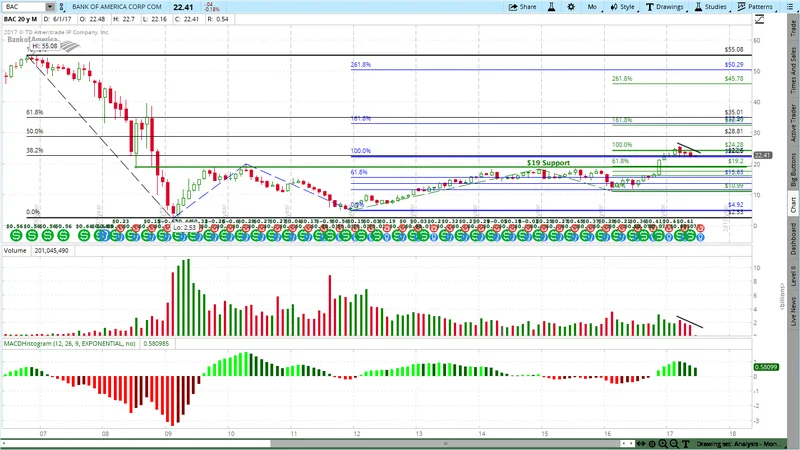So, Bank of America printed money again. Let’s all stand up and slow clap for the wizards on Wall Street. Their third-quarter earnings didn’t just beat expectations; they curb-stomped them, left them in an alley, and walked away whistling. Earnings per share of $1.06 when the so-called experts predicted 95 cents. Revenue of $28.1 billion when they were hoping for a measly $27.5 billion. Bank of America tops expectations on 43% surge in investment banking revenue.
The stock, offcourse, shot up. Everyone who already has money is making more money.
Isn’t this great?
The Wall Street Magic Show
Before you rush off to dump your savings into BAC stock, let's pull back the curtain on this spectacular performance. Where did all this magical money come from? Did they suddenly revolutionize customer service or invent a new, less-annoying banking app? Don't be silly. The growth came from a surge in investment banking and a 9% jump in net interest income.
In plain English: they made a killing from market chaos and charging more for loans.
This is the financial equivalent of a blockbuster movie trailer. All you see are the explosions—the big, sexy numbers from the Global Markets division, the advisory fees from M&A deals, the IPO frenzy. It's loud, it's exciting, and it’s designed to make you feel like you’re missing out on the cinematic event of the year. But the trailer never shows you the boring, two-hour plot about a dysfunctional economy or the part where the main character (that’s you) gets a smaller and smaller role.
Investment banking thrives on uncertainty. Corporate shakeups, geopolitical drama, wild market swings—that’s their bread and butter. So while the rest of us are biting our nails about inflation or whatever the Fed is mumbling about this week, these guys are popping champagne. Does that feel like a stable foundation for an economy, or does it feel like a high-stakes poker game where we’re not even invited to watch, let alone play?
Let's "Translate" That Corporate Gibberish
The best part of any earnings report is always the quote from the CFO. It’s a masterclass in saying absolutely nothing while sounding profound. Bank of America’s Alastair Borthwick delivered a classic:
“Our strong capital position enabled us to support clients, growing average loans by $25 billion from the second quarter, and to return $7.4 billion to shareholders…”

Let me put on my corporate-to-human translator headset.
“Strong capital position” means “We’re sitting on a dragon’s hoard of cash.”
“Support clients” means “We lent out more money, which people and businesses are increasingly desperate for, and we’re collecting the interest, thank you very much.”
And the grand finale: “return $7.4 billion to shareholders.” This is the part they want you to cheer for. But what does it actually mean? It means stock buybacks and dividends. Buybacks reduce the number of shares out there, artificially pumping up the earnings per share and making the stock price look prettier. It's financial vanity. It’s a bad idea. No, ‘bad’ doesn’t cover it—this is a systemic addiction that prioritizes short-term stock bumps over long-term investment in, you know, actual businesses or technology or people.
This isn’t about building a better bank or a stronger economy. It's about making the number go up for the people who already own the numbers. And honestly, it reminds me of the time they charged me a $35 overdraft fee for a coffee because a subscription I forgot about processed a day early. They "supported" me, alright.
The Analysts Are Cheering. Should You?
Naturally, the Wall Street choir is singing praises. A "Strong Buy" consensus, with 17 analysts screaming "Buy!" and only one lone soul meekly suggesting "Hold." The average price target suggests another 12% upside. It’s a party, and you’re invited! BAC Earnings: Bank of America Stock Rallies on Strong Q3 Results.
But who are these analysts? Are they impartial monks meditating on market truths from a mountaintop? Or are they part of the same ecosystem, working for institutions that also have skin in the game? When the whole system is designed to reward growth at any cost, why would anyone break rank and point out that the emperor is wearing a ridiculously expensive but ultimately invisible suit?
They see a company that’s expertly playing the game, and they reward it. They see a stock that’s going up, and they predict it will go up more. It’s a self-fulfilling prophecy, a feedback loop of positive reinforcement that can feel amazing on the way up. But it completely ignores the fundamental questions about value, stability, and whether any of this is realy sustainable.
Then again, maybe I’m the crazy one. Maybe a bank that profits from volatility and rewards shareholders over everything else is the peak of modern capitalism, and I’m just too simple to get it. Maybe…
So We're All Supposed to Clap Now?
Let's be real. This isn't a victory for the economy; it's a victory for an algorithm. Bank of America did exactly what it was designed to do: extract wealth from the system and channel it to its owners. The numbers are bigger, the stock is higher, and the executives will get massive bonuses. It’s a perfect quarter. But it feels hollow, like celebrating a casino for having a profitable night. The house always wins. We know that. Do we have to pretend it’s a feel-good story?










